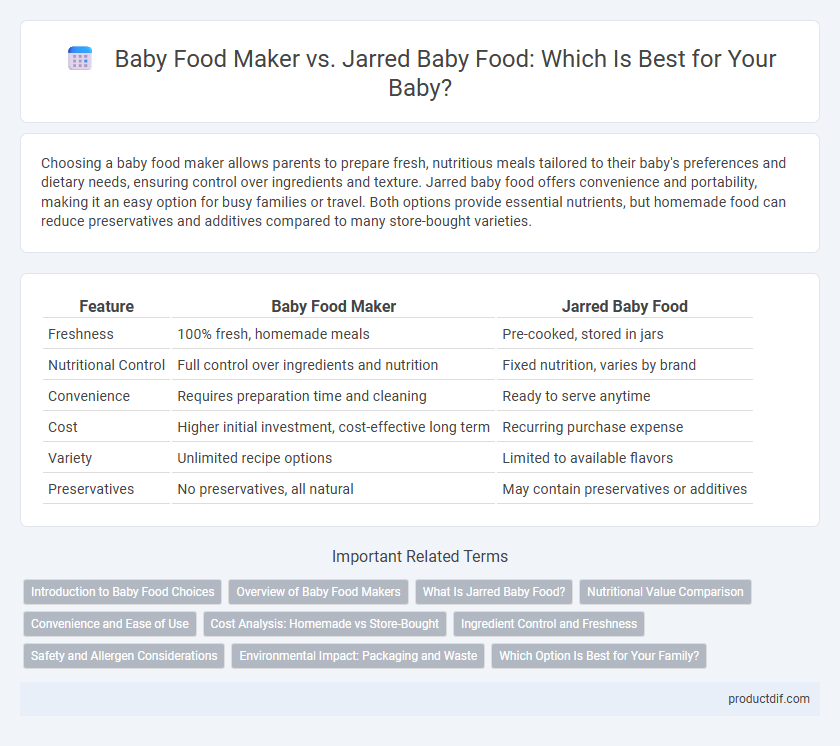Choosing a baby food maker allows parents to prepare fresh, nutritious meals tailored to their baby's preferences and dietary needs, ensuring control over ingredients and texture. Jarred baby food offers convenience and portability, making it an easy option for busy families or travel. Both options provide essential nutrients, but homemade food can reduce preservatives and additives compared to many store-bought varieties.
Table of Comparison
| Feature | Baby Food Maker | Jarred Baby Food |
|---|---|---|
| Freshness | 100% fresh, homemade meals | Pre-cooked, stored in jars |
| Nutritional Control | Full control over ingredients and nutrition | Fixed nutrition, varies by brand |
| Convenience | Requires preparation time and cleaning | Ready to serve anytime |
| Cost | Higher initial investment, cost-effective long term | Recurring purchase expense |
| Variety | Unlimited recipe options | Limited to available flavors |
| Preservatives | No preservatives, all natural | May contain preservatives or additives |
Introduction to Baby Food Choices
Choosing between a baby food maker and jarred baby food involves considering freshness, convenience, and nutritional value. Baby food makers allow parents to prepare customized, homemade meals with control over ingredients and texture, promoting natural nutrition and reducing preservatives. Jarred baby food offers quick, ready-to-use options with extended shelf life, making feeding simpler for busy caregivers while ensuring safety and variety.
Overview of Baby Food Makers
Baby food makers offer a convenient solution for parents aiming to prepare fresh, nutritious meals tailored to their baby's dietary needs. These appliances typically combine steaming, blending, and pureeing functions in one device, ensuring the retention of essential vitamins and minerals. Using a baby food maker allows for control over ingredients, texture, and portion size, providing a fresh alternative to jarred baby food.
What Is Jarred Baby Food?
Jarred baby food is commercially prepared and packaged in glass jars, offering a convenient and shelf-stable option for feeding infants. It contains pureed fruits, vegetables, or meats that undergo sterilization to preserve freshness and nutritional value. Parents often choose jarred baby food for its ease of use, variety, and consistent quality compared to homemade alternatives.
Nutritional Value Comparison
Homemade baby food made with a baby food maker retains more nutrients, such as vitamins A, C, and folate, compared to jarred baby food, which often undergoes high-heat processing and preservatives that reduce nutrient content. Freshly prepared purees from a baby food maker provide better texture variety and richer antioxidant levels essential for infant development. Selecting a baby food maker ensures higher moisture retention and minimal nutrient degradation, promoting optimal growth and health in infants.
Convenience and Ease of Use
Baby food makers offer fresh, customizable meals with minimal prep time, allowing parents to control ingredients and texture for their baby's developmental needs. Jarred baby food provides unparalleled convenience with ready-to-serve portions that require no preparation or cleanup, ideal for busy schedules or travel. Both options cater to different lifestyles, but baby food makers excel in freshness and customization, while jarred food wins on instant accessibility and storage longevity.
Cost Analysis: Homemade vs Store-Bought
Homemade baby food made with a baby food maker often reduces costs by utilizing fresh, bulk-purchased ingredients, which can be significantly cheaper than jarred baby food. While the initial investment in a baby food maker can range from $50 to $150, the long-term savings on store-bought jars, typically priced between $1 to $3 each, quickly offset the upfront expense. Parents also benefit economically by controlling portion sizes and avoiding wastage common with pre-packaged baby food.
Ingredient Control and Freshness
Baby food makers offer superior ingredient control by allowing parents to select fresh fruits, vegetables, and grains, ensuring meals are free from preservatives and additives commonly found in jarred baby food. Freshly prepared baby food retains higher nutritional value and better flavor compared to pre-packaged options that may undergo processing and extended shelf life. The ability to customize textures and portion sizes also supports tailored nutrition aligned with a baby's developmental needs.
Safety and Allergen Considerations
Baby food makers offer greater control over ingredient selection, reducing the risk of allergens and ensuring fresh, preservative-free meals tailored to your child's dietary needs. Jarred baby food undergoes strict safety regulations and quality checks but may contain additives or traces of allergens that are less visible compared to homemade preparations. Parents concerned about potential allergens benefit from using a baby food maker to customize meals, enhancing safety by avoiding cross-contamination and unlisted ingredients commonly found in commercially jarred options.
Environmental Impact: Packaging and Waste
Baby food makers reduce environmental impact by minimizing packaging waste since homemade purees require reusable containers instead of single-use jars. Jarred baby food generates significant plastic and glass waste, contributing to landfill accumulation and resource depletion. Choosing baby food makers supports sustainable practices by lowering packaging consumption and promoting eco-friendly meal preparation.
Which Option Is Best for Your Family?
Choosing between a baby food maker and jarred baby food depends on your family's lifestyle and nutrition priorities. Baby food makers offer fresh, preservative-free meals with customizable textures and ingredients, ideal for parents seeking control over their baby's diet. Jarred baby food provides convenience and consistent safety standards, making it a practical choice for busy families or travel.
Baby Food Maker vs Jarred Baby Food Infographic

 productdif.com
productdif.com